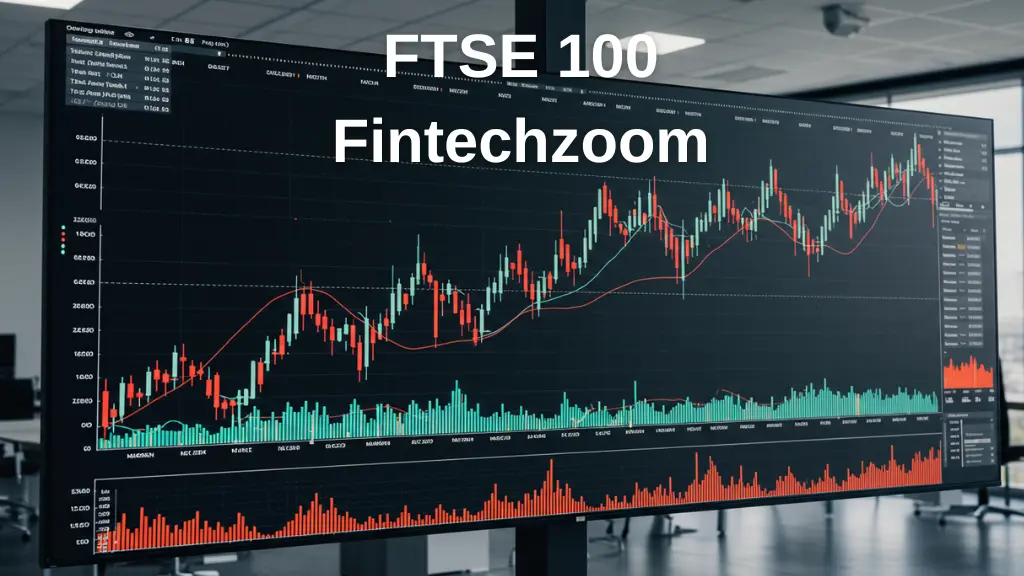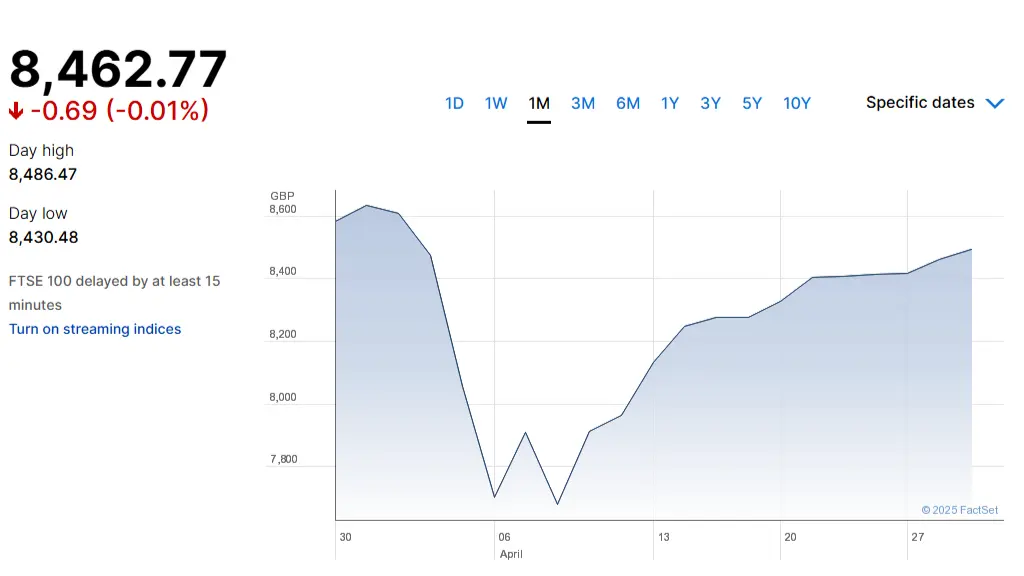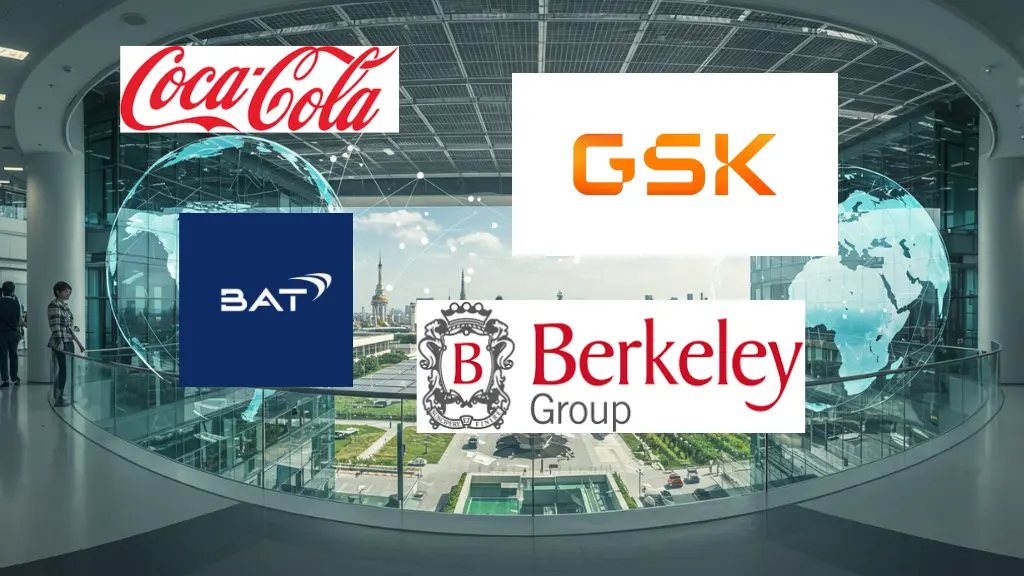FTSE 100 FintechZoom | Top Companies to Watch

The Financial Times Stock Exchange (FTSE 100) is the UK’s index that tracks the performance of the top 100 companies on the London Stock Exchange. These companies are giants from each industry. Regular investors cannot invest in these companies unless they are ready to take big risks.
If you’re interested in these stocks, FTSE 100 FintechZoom provides a platform where you can see daily updates and simple charts to explore this index’s trends. To simplify it further for you, I have created this detailed guide on how to monitor the FTSE 100.
What Is the FTSE 100 Index in the UK?
Just like the S&P 500 in the U.S. or the Nasdaq, the FTSE 100 index or informally called as “Footsie” is used in UK to measure stock performance of the top 100 blue chips on LSE. It is like a mirror of UK’s local economy and shows how well these major companies are doing. These businesses are the largest in the UK by market value. You can see big names such as HSBC, BP, Unilever, and Tesco on this list.
Recent Updates and News of FTSE 100
On April 30, 2024, the FTSE 100 index was at 8,494.85 points, which was a 0.4% rise. Although this index had a bit of a rollercoaster these past days but now it has managed to bounce back.
Recently, the U.S. economy showed signs of shrinking and Wall Street took a hit but the FTSE 100 held strong and regained most of its earlier losses. Companies like GSK lifted investor modd by sharing solid growth plans, and Genus had a huge win with approval for its gene-edited pigs in the U.S — their stocks were rising.
But don’t get too excited because despite the recent gains, FTSE 100 index remains ready for a drop for the month based on prior losses due to U.S. market trade tariffs.
Previously, the all-time high closing value of the FTSE 100 was 8,871.31 on March 3, 2025. This was due to good company earnings and hopes for interest rate reductions.

Top Companies in the FTSE 100 Right Now
I know that if you’re new to the FTSE 100, you’ll have no idea how to target all these large corporations listed on the index. My solution in this case is to use FintechZoom FTSE 100 as my guide and learn about all these companies current and historical performance.
But first, let’s give you a basic understanding from what I’ve gathered about the top most companies on FTSE 100:
AstraZeneca
AstraZeneca is an international pharmaceutical giant with a particular emphasis on oncology and respiratory medicines. It hit a valuation of £200 billion in 2025 due to its healthy portfolio of cancer medicines and consistent scientific progress in oncology drugs.
HSBC Holdings
HSBC is a worldwide banking and financial services group with operations across the globe. It provides personal banking, commercial banking, as well as wealth management services. HSBC’s global network makes it a leading force in international finance.
Shell plc
Shell is a British multinational oil and gas company that is involved in all sorts of oil and gas tasks such as exploration, refining, and distribution. Shell is one of the world’s largest companies in terms of revenue, with operations in more than 99 countries. Not just that, Shell has also started investing in renewable energy.
Unilever Group
Unilever is the 6th largest consumer goods company and their products are everywhere. It’s portfolio is vast as it owns well-known brands used in daily lives like Dove, Knorr, and Lipton. The company is well-reputed as they are dedicated to sustainability and innovation has contributed to its market presence.
RELX plc
RELX is a worldwide provider of information-based analytics and decision tools to professional and business customers. It has operations across several sectors such as scientific, technical, medical, legal, and business information. RELX’s digital evolution has been instrumental in its growth and resilience.
British American Tobacco
British American Tobacco is a top consumer goods firm that manufactures and sells tobacco products. Their operations spread across more than 180 markets. They are expanding in the less-risky products like e-cigarettes and heated tobacco.
BP plc
BP is a British multinational oil and gas company that is engaged in the entire energy business. It has been investing in clean energy sources and plans to become a net-zero company by 2050. BP’s sustainability drive is aimed at lowering carbon emissions.
Rio Tinto Group
Rio Tinto is a mining group globally operating across multiple commodities such as iron ore and copper. Its operations target mining, exploration, and processing mineral resources. Its focus includes adopting sustainable means in mining combined with innovation.
GSK plc
GSK is an international healthcare company that develops, researches, and produces pharmaceutical drugs and customer healthcare products. The company has leadership in the infectious diseases area. GSK’s focus on R&D fuels its pipeline of innovative treatments.
Diageo plc
Diageo is a British multinational alcoholic beverage corporation with a large collection of spirits and beers. Some of its notable brands include Johnnie Walker, Guinness, and Smirnoff. Diageo has a global network of distributors, which helps to distribute its products across the globe.
Which Factors Affect the Price of the FTSE 100?

Like any other stock market index, the FTSE 100 fluctuates based on worldwide news and several other factors, such as:
Company Performance
FTSE 100 represents top 100 companies of LSE so their growth and downfall have the most impact on this index’s trends. If it’s a good report from the likes of Shell or AstraZeneca, its investors normally buy more shares of its stock. This pumps its value higher and lifts the entire index up.
But when such companies turn in losses, layoffs, or decreased sales, their stock values go down with them and lower the index as well.
UK Economic News
UK economic news, such as inflation or GDP growth, has the potential to greatly affect the FTSE 100. If the economy is growing strongly, investors feel more confident and hence they buy more shares, causing the index to increase.
On the other hand, if inflation is rising or unemployment increases, people fear a slowdown and the index starts to decline as a consequence.
Bank of England Interest Rates
The Bank of England regulates interest rates, and the changes it implements can influence company profits and investor choices. Higher interest rates increase the cost for companies and customers to borrow. Lower rates make borrowing less costly, which encourages businesses to grow.
Global Events and Crises
When investors fear a downward trend in market due to global events, companies lose their stock value and that’s when we can see a decline in Footsie. For example, the ongoing tensions between the U.S. and China have impacted the FTSE 100 index.
Strength of the Currency (British Pound)
The strength of the British pound is a major factor since most FTSE 100 firms make a great deal of money abroad. When the pound is low, their foreign revenues are more valuable in sterling terms, making their shares more desirable and pushing up the index.
However, when the pound rises, those same revenues are less valuable, which can cause share prices to fall and reduce the FTSE 100.
Market Sentiment
Even without big news, if investors believe bad times are ahead, they can start selling shares, which can very easily send the FTSE 100 down. Positive sentiment does the opposite; people buy more because they are optimistic, and the index rises higher.
What Does FTSE 100 FintechZoom Predicts?
I’ve read experts analysis and they indicate that the index might exceed 9,000 by the end of the year. This will happen maybe because of the like declining interest rates and government policies to drive investment.
The FTSE 100’s success is linked to worldwide markets, with around 75% of its revenue originating from outside which makes it vulnerable to global economic trends. It is dominated by industries like finance and energy so any fluctuations in them have a domino effect on the FTSE index. FintechZoom suggests that we should create proper risk management strategies before setting our eyes on stocks that are in FTSE 100.
Conclusion
FTSE 100 FintechZoom is one of the biggest indicators of the UK’s economic well-being. International markets, currency fluctuations, and sector shifts all play a big role in deciding its future.
Investment in the FTSE 100 demands us to have a good sense of important corporate trends. Use FintechZoom to get useful and timely updates on the FTSE 100’s performance so you can invest with lower risk.
FAQs
How Can a Newbie Invest in the FTSE 100?
The simplest and cheapest route is to buy an FTSE 100 exchange-traded fund (ETF) or tracker fund.
What Is the Average Return on FTSE 100?
The average real annualised return of the FTSE 100 index has been 3.5%.
How Is the FTSE 100 Calculated?
The FTSE 100 is calculated by weighting the market capitalization of all stocks listed on the London Stock Exchange.
